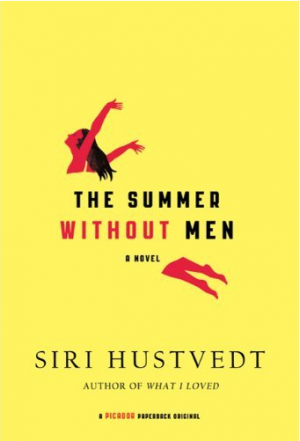The Summer Without Men

The basic storyline of The Summer Without Men, while not startling or original, seemed full of possibility: husband cheats, wife goes to her childhood home for a respite to recover, and along the way makes potentially hopeful discoveries about herself. I anticipated a bitter beginning, full of hurt feelings, with some healing by the end. However, either the moment of redemption never arrived, or it was obscured by the lack of clarity in the narrative.
Siri Hustvedt has given us for a protagonist Mia Fredrickson, an intellectual poet who has almost nothing good to say about anybody, except for the philosophers and poets who stream through her mind and punctuate moments of daily life. Her library of poets-at-the-mental-fingertips was the most charming thing about her, and most readers could likely relate to the way a quote or a lyric arises unbeckoned from one’s memory. Mia assails the reader with her stream of consciousness ramblings, bouncing from observations about her detestable, cheating spouse to glimpses of her mental breakdown to detached remarks about her daughter. At times, it was difficult for me to remember where she was in space or time because her ramblings were hard to follow.
To my disappointment, Mia Frederickson was not a very sympathetic protagonist. She spends time with the women in a home for the elderly where her mother lives, and one scene raised my hopes that Mia might feel some humility, some sense of connection with other women. Instead, she continues to sound bitter and superior. When she befriends a young neighbor with a troubled marriage, I thought perhaps this friendship would bring moment of real connection. Instead, after she holds the neighbor’s baby, she describes it as a “borrowed homunculus.” This variety of cold, pretentious language fills the book and makes Mia rather difficult to connect with.
Toward the very end of the book Hustvedt asks, “Who among us would deny Jane Austen her happy endings?” Perhaps I am naive and too fond of stories that show the healing rather than the bitterness. After all, Mia’s husband has cheated after a long marriage full of disappointing moments. She was the supportive wife in the background, whose intellect often propelled her husband’s achievements while her voice went unrecognized. However, throughout the novel her voice is cool and distant, and events that might contribute to healing and growth seem to create no real effect. In this way, the novel reads more like a series of jarring snapshots.
Author Siri Hustvedt is the author of five novels, and this was my first encounter with her work. It may be that one of her earlier works would suit me better.